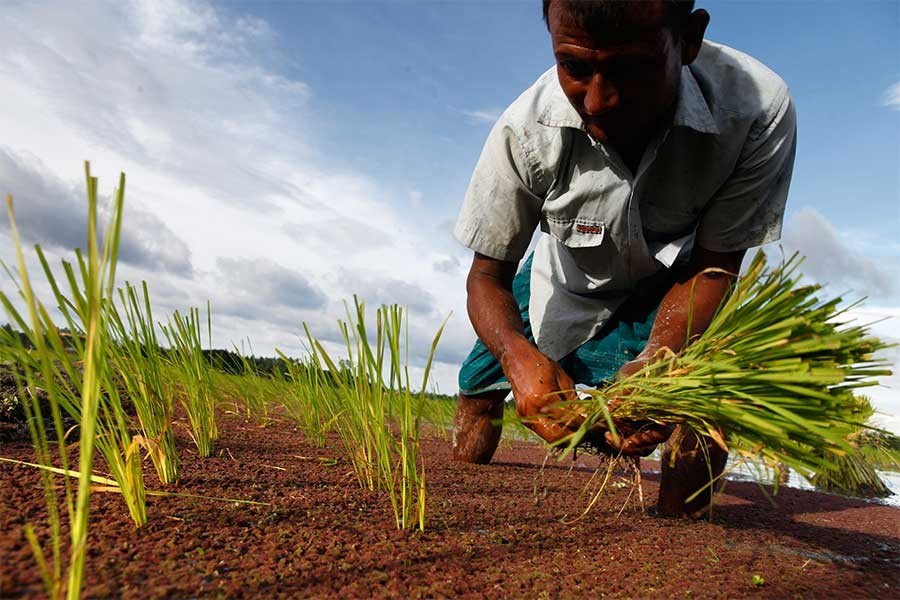
Published :
Updated :

The government's programme to provide incentive to farmers for purchasing farm machinery has become stagnant due to lack of fund, said officials at the Ministry of Agriculture (MoA).
To boost farm production and address the issue of scarcity of farm labourers, the government has put thrust on mechanisation. The government gives incentive to farmers for purchasing farm machinery, aiming to attain the targeted growth in the agriculture sector.
But the fund crisis has forced the authorities to stop providing incentive on farm machinery since June last, said an official.
"The MoA sought Tk 4.0 billion from the Ministry of Finance (MoF) in this regard, but the MoF has recently allocated only Tk 1.0 billion," he said.
He also said frustration has gripped the officials concerned amid fund crisis, as they are in the doldrums with such a low amount against high demand.
Agriculture Minister Dr Abdur Razzaque, however, said his ministry sought Tk 4.0 billion after taking into account field-level demand and that there is nothing to worry about incentive.
"I hope the MoF will provide our expected amount to help continue the country's farm mechanisation process smoothly."
He also said the MoA has almost completed compiling data on demand for farm equipment, which can be published soon.
"We are focusing on farm mechanisation process to attain food autarky, and to make our production almost double within 2030."
He opined that farm mechanisation can also minimise the demand for labourers, whose scarcity has emerged as a problem in recent days.
"Besides tractor and power-tiller, farmers are now also interested to use other machinery such as combined harvester, ripper and rice transplanter etc," he added.
Alimul Ahsan Chowdhury, President of Bangladesh Agricultural Machinery Manufacturers Association, told the FE that their sales declined by 70 per cent following the halt in providing incentive.
He said about 21,000 farm machinery manufacturers and sellers in the country are trying to facilitate the farm mechanisation process. But higher prices of some equipment are discouraging farmers from buying those.
"For the last few months, we have been hearing from agriculture officials that fund for incentive will be released soon."
"Farmers are now highly interested to buy machinery, if they get incentive facility, amounting to 30-70 per cent of equipment prices," he noted.
Prof Dr Md Monjurul Alam of Bangladesh Agricultural University (BAU) said in terms of crop harvesting mechanisation, use of mini combine harvesters, which cut, thresh and bag grains simultaneously, has emerged as a game-changing solution to farmers through saving cost, time and human labour.
The government should take up measures to raise incentive, as sale of modern equipment such as combined harvesters and transplanters remains sluggish and much below expectation.
Besides, local agriculture sector has almost stopped growing amid lack of proper incentive and awareness campaign.
Agri officials should also work to raise awareness among farmers about usefulness of harvesters, transplanters and reapers etc, he added.
Md Enamul Haque, head of business development of Metal Pvt Ltd, said at present the country's farmers are using about 50,000 tractors and 700,000 power tillers, and these have mechanised 90 per cent of ploughing.
"But use of ripper, combined harvester or rice planter is very low, which is also necessary to make total farming process mechanised."
He further said there is a demand for 100,000 units of combined harvester in the country, but local farmers have only 1,000 units. Demand for rice planter is 200,000 units, whereas farmers have only 950 units.
China-made global combine harvester brands, marketed by Metal Pvt Ltd, costs Tk 2.0 million each, which may be available to farmers at a cost of Tk 1.0 million, if 50 per cent subsidy is given.
A rice transplanter (walking type) can be bought for Tk 350,000 and a reaper for Tk 150,000 with subsidy, he added.
tonmoy.wardad@gmail.com


 For all latest news, follow The Financial Express Google News channel.
For all latest news, follow The Financial Express Google News channel.